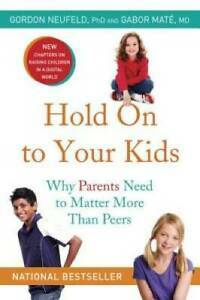Take a photo of a barcode or cover
199 reviews for:
Hold On to Your Kids: Why Parents Need to Matter More Than Peers
Gabor Maté, Gordon Neufeld
199 reviews for:
Hold On to Your Kids: Why Parents Need to Matter More Than Peers
Gabor Maté, Gordon Neufeld
informative
inspiring
reflective
fast-paced
I agree with the general message of this book - take the time to connect with your kids and establish a healthy, loving relationship. Kids need a stable adult connection more than a bunch of friends.
I did feel like it was pretty repetitive and he just talked in circles and beat a dead horse, particularly the first half (explaining the horrors that abound when kids attach to their peers instead of their parents).
I did find value in this book and will apply it to my parenting, although, honestly, it was already my parenting style so I don't have to change much. I homeschool my kids so we are able to maintain a close relationship and I love them for who they are and try to show that.
I did feel like it was pretty repetitive and he just talked in circles and beat a dead horse, particularly the first half (explaining the horrors that abound when kids attach to their peers instead of their parents).
I did find value in this book and will apply it to my parenting, although, honestly, it was already my parenting style so I don't have to change much. I homeschool my kids so we are able to maintain a close relationship and I love them for who they are and try to show that.
Great book on Attachment parenting. His thesis is that parents have given up their roles and relationships with their children who have them attached themselves to their peers.
This isn’t an easy read or a quick how to. He goes in-depth into attachment theory and peer attachment that is happening. I thought his actually advice on how to help the parents re-develop their relationships with peer oriented children more philosophical and less implementable. Even as I’ve finished I’ve found few ways to better build my relationship. He also seems to turn and dislike all typical parenting techniques. Again, though I think he had a point, I felt overwhelmed and unsure of how to actually apply his methods and philosophies.
This isn’t an easy read or a quick how to. He goes in-depth into attachment theory and peer attachment that is happening. I thought his actually advice on how to help the parents re-develop their relationships with peer oriented children more philosophical and less implementable. Even as I’ve finished I’ve found few ways to better build my relationship. He also seems to turn and dislike all typical parenting techniques. Again, though I think he had a point, I felt overwhelmed and unsure of how to actually apply his methods and philosophies.
I approached this book with skepticism, but as I progressed through the chapters, the more and more it resonated with me as both a parent and an educator. I read some of the negative reviews of this book and have come to the conclusion that it is a victim of semantics. Some of the language sounds overly conservative, nostalgic, and out of touch with parenting. However, as I continued to read and dissect the language, I felt the ideas they were promoting were quite progressive and are currently the new buzzwords in education: social-emotional learning and restorative practice and relationship building. I have seen how fellow teachers and administrators have failed time and again with these authoritarian approaches. Getting students to like you and connect with you is the easiest way to discipline. As a parent, I felt validated in wanting to keep my kids close, and I have seen what can happen when they disconnect from us. The one fault I had with the content was a small piece that suggested parents do whatever they can to build a proverbial village. This was one area where I felt the writers were deeply out of touch. If we are to keep our children from being peer-oriented, why should we extend and expand our own peer orientation, especially when so many parents today do not hold the same values or act in mature ways? I think there needs to be some exploration of the fact that GenXers were an exceptionally peer-oriented generation and that bullying and peer pressure still exist among them as adults.
This was a really valuable read for parents or those who work closely with parents and children. While I wish the evidence base they presented was stronger, the hypothesis is clear and difficult to disagree with, and they did an incredible job at debunking and explaining specific myths about parenting and development. The emphasis on the relationship between parent/child, rather than what words are spoken or tangible/material actions was also really helpful. I will revisit this in future.
I agreed with the premise, but I did end up skimming and skipping through the book. The tone overall came off a bit too much like a scare-tactic. I do think this book would be helpful particularly for people who didn’t grow up with healthy parental attachments.
This was a startling and captivating read. While it was written year ago I think the premise still very much applies and explains much of what I have seen in society, schools and relationships.
While we continue to move further away from attachment in our North America relationships it is good to have some ideas of concrete steps to take within my own life to help fill some voids.
While we continue to move further away from attachment in our North America relationships it is good to have some ideas of concrete steps to take within my own life to help fill some voids.
informative
medium-paced
dark
reflective
sad
tense
medium-paced
informative
inspiring
reflective
medium-paced
A must read for all parents




